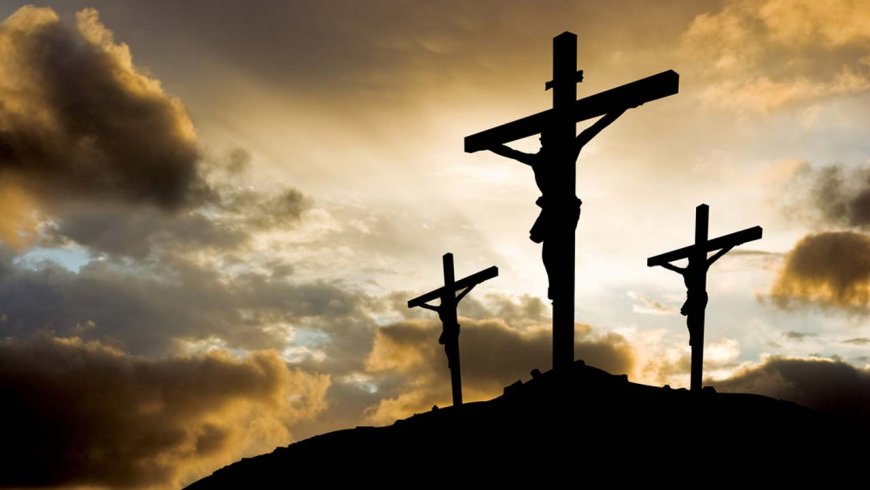Why It Is Called 'Good Friday'
Let’s be real, calling the day Jesus was beaten, mocked, and nailed to a cross “Good Friday” feels...weird.

Every year, Christians around the world observe a holiday that commemorates the day Jesus Christ was crucified on the cross, called 'Good Friday'.
Let’s be real, calling the day Jesus was beaten, mocked, and nailed to a cross “Good Friday” feels...weird. Morbid even. So, how did one of the darkest days in Christianity end up with a name that makes it sound like a discount sale?
The Day That Changed Everything
First off, Good Friday is the day Christians believe Jesus Christ was crucified. It's part of Holy Week, leading up to Easter Sunday, when Jesus is believed to have risen from the dead. According to Christian theology, Jesus' death was the ultimate sacrifice — a necessary act to save humanity from sin.

A silhouette photo of Jesus Christ on the cross. /iSTOCK
So while the events of the day were brutal and heartbreaking, they’re seen by believers as good in a cosmic sense. The short-term horror led to long-term hope.
The Etymology Angle: Was It Always Called ‘Good’?
Here’s where it gets interesting. The term “Good Friday” wasn’t originally used everywhere, and still isn’t. In many languages, the name reflects the sorrow of the day:
-
In German, it's called Karfreitag, which translates to “Sorrowful Friday.”
-
In Spanish, it’s Viernes Santo — “Holy Friday.”
-
In French, Vendredi Saint — again, “Holy Friday.”
So why does English go with good? One theory is that “Good” used to mean “holy” or “pious.” This is slightly akin to how we still say “The Good Book” when we mean the Bible.
Some linguists believe the name might come from an older phrase like God’s Friday (similar to “goodbye” being short for “God be with ye”), which got smoothed out over time into “Good Friday.”
Another theory is that the name reflects the outcome rather than the event. Jesus’ suffering was seen as “good” because it led to redemption — a win for humanity, even if the day itself was a loss for him.
Events Leading To Jesus' Crucifixion & Death
On Good Friday, Christians observe the day with fasting, prayer, and church gatherings, often taking part in a symbolic procession to remember the crucifixion of Jesus.
According to the Bible, the events began when Judas Iscariot, one of Jesus’ disciples, betrayed Him by revealing His location to Jewish soldiers, who then arrested Him in the Garden of Gethsemane.
Jesus was first brought before the High Priest, Caiaphas, who led the Sanhedrin—the Jewish council, which can be likened to a modern-day Supreme Court. The council had already decided to put Jesus on trial and was searching for a reason to justify a death sentence.
During the trial, Jesus was accused of blasphemy for claiming to be the Christ. He was then beaten and handed over to the Roman governor, Pontius Pilate, since under Roman law, the Jewish council didn’t have the authority to carry out executions.
Before Pilate, Jesus was charged with treason for allegedly opposing the Roman government. Though Pilate found no fault in Him, public pressure and demands for punishment grew. Eventually, Pilate gave in to the crowd’s demands and sentenced Jesus to be crucified, though, in an act of symbolic disapproval, he washed his hands of the decision.
A Painful Story With a Purpose
Whether or not you’re religious, the story of Good Friday is undeniably heavy. It’s about betrayal, injustice, sacrifice — all packed into one day. But for Christians, it's also about love, grace, and second chances. That's the "good" part.
Good Friday, thus, is not about brushing over the pain. It is about recognising that sometimes good things are born out of suffering. That's the core message: out of death came life. Out of despair came hope.
So “Good Friday” might sound like a misnomer at first glance, but when you look at it through the lens of Christian theology and old-school English, the name makes sense. It’s a reminder that what looks like defeat can actually be the start of redemption — a plot twist that defines the entire Easter story.
How The Date Of Easter (Good Friday Included) Is Calculated
Good Friday is observed on the Friday before Easter, but the exact date varies between Eastern and Western Christianity due to different methods of calculation. Easter is celebrated on the first Sunday after the Paschal Full Moon, which is the first full moon on or after March 21, recognised as the date of the spring equinox.
Western churches use the Gregorian calendar to determine this, while Eastern churches follow the Julian calendar, where March 21 currently aligns with April 3 on the Gregorian calendar. The method for determining the date of the full moon also differs between the two traditions.
As a result, in Eastern Christianity, Easter can fall between March 22 and April 25 on the Julian calendar, which corresponds to April 4 to May 8 on the Gregorian calendar (for the years 1900 to 2099). Consequently, Good Friday in the Eastern tradition can occur between March 20 and April 23 (Julian), or April 2 and May 6 (Gregorian).







